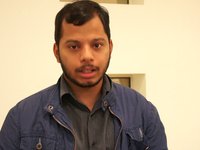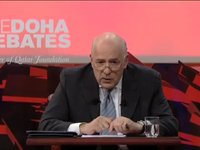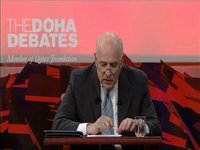This House believes Turkey is a bad model for the new Arab states
Thursday January 12 2012
Bogazici University, Istanbul
MOTION PASSED
by 59% to 41%
Transcript
Order of speeches
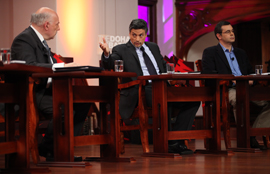
- Introduction
- Ece Temelkuran
- Sinan Ulgen
- Hassan Mneimneh
- Aboubakr Jamai
- Audience questions
- Vote result
Introduction
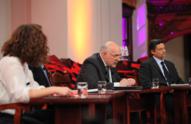 TIM SEBASTIAN
TIM SEBASTIAN
Ladies and gentlemen. Ladies and gentlemen, a very good evening to you, and welcome to The Doha Debates, coming to you from the Turkish city of Istanbul and sponsored by the Qatar Foundation. We're guests of the Bosphorus or the Boğaziçi University, which in fact overlooks the waterway itself - one of the world's most important shipping lanes, forming part of the boundary between Europe and Asia. It's a unique vantage point on which to hold tonight's debate, and we're delighted to be here. Over the last year, as much of the Arab world has sunk into chaos, many Arab eyes have turned towards Turkey: could this country provide a model for those new Arab states, a successful blend of Islam and democracy, or do a number of deep and worrying questions about its human rights record rule out Turkey as an example to follow? Questions that lie at the centre of our debate and our motion, controversial as ever: ‘This House believes that Turkey is a bad model for the new Arab states.' As usual, you the audience will decide the issue by your vote, but not before we've heard in detail from our panellists, who disagree profoundly with each other. Speaking for the motion, they are: Ece Temelkuran, one of Turkey's best-known award-winning reporters and commentators. Not that that prevented her from joining the ever-multiplying ranks of unemployed Turkish journalists, after writing about a Turkish air strike that went badly wrong. Also in favour of the motion: Hassan Mneimneh. He's a Senior Transatlantic Fellow at the German Marshall Fund. He has also served as Director for the Iraq Memory Foundation, which promoted political responsibility and justice in Iraq. Speaking against the motion: Sinan Ülgen, visiting scholar at Carnegie Europe in Brussels and chairman of the Center for Economic and Foreign Policy Studies here in Istanbul. As a Turkish diplomat he has served both in Brussels and Tripoli. And with him: Aboubakr Jamaï, co-editor of the Moroccan news website lakome.com. He's won several awards for his support of press freedom and is now a visiting fellow at Harvard University. Ladies and gentlemen, our panel. [Audience applause] So could I first ask Ece Temelkuran to speak for the motion, please.
Ece Temelkuran
Speaking for the motion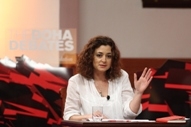
ECE TEMELKURAN
Thank you. There is no Turkish model. There is the AKP model, which represents only 47 percent of this country. Yet it is understandable for the outside world to be deceived, because the political and intellectual representatives of the remaining 53 percent are either in jail or silenced by various kinds of oppressions. AKP cannot be a model for the Arab world because, firstly, Turkey has been under a state for modernism and secularism for about eighty years, which has not been experienced anywhere in the Arab world in the same manner. Secondly, AKP's so-called `accomplishments' couldn't have happened without the long-lasting network of Fethullah Gülen's movement, that has no equivalent in the Arab world. AKP and its so-called model is an outcome of fifty years of conservative Islamist Brotherhood. The history of the Brotherhood goes back to Association for Struggle Against Communism, which has been reportedly collaborating with the CIA during the Sixties. Throughout recent history, the same Brotherhood got organised in every possible economic sector, and today it's proved by scientific research that nobody can operate in any sector in Anatolia without the approval of this network. The economic transactions of this network has never been, and still is not, transparent. The network's political hegemony is un-negotiable as well. My friends and colleagues Ahmet Şık and Nedim Şener have been in jail for eleven months for just writing a book about how Fethullah Gülen's movement got organised in the intelligence service. The AKP party promised to end the military hegemony in Turkish politics but just replaced it with their very own authoritarian regime, where people are labelled as terrorists if they criticise the government. Massive political arrests have become an integral part of the AKP model. There are 500 students, more than 100 journalists, over 3,500 Kurdish and Turkish politicians in jail today. According to the latest AP survey, one-third of the world's terrorists are based in Turkey. For many other anti-democratic practices, Turkey cannot be a model for the Arab world, simply because Arabs have already enough problems. [Audience applause]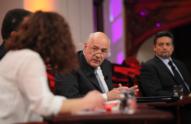 TIM SEBASTIAN
TIM SEBASTIAN
Ece Temelkuran, thank you very much indeed. What Arabs don't have much of is democratically elected governments. That's a good starting point, that's a good attraction of the Turkish model to them, isn't it?
ECE TEMELKURAN
Yes, we don't have here.
TIM SEBASTIAN
A government that you can elect and throw out?
ECE TEMELKURAN
Yes, we have a democratically elected government, but it's not operating in a democratic way, let's put it that way.
TIM SEBASTIAN
But then it can be thrown out if the electorate don't like it, can't it?
ECE TEMELKURAN
Well, I don't know..
TIM SEBASTIAN
That's one of the safeguards of democracy.
ECE TEMELKURAN
They're silenced in many different ways, so I don't know if they can be a warning for the next election either. Because many of them have been in jail, labelled as terrorists, already.
TIM SEBASTIAN
But you mentioned the military. They've tamed a military that's organised, what, four coups over the last fifty, sixty years.
ECE TEMELKURAN
You mentioned my unemployment, so I can say that my last article, which actually I think caused me to be ousted from the newspaper, the title was: `Sir, yes, Sir.' And I told that these are our new commanders and that we shouldn't listen to them anymore.
TIM SEBASTIAN
No, but the point is you now have a civilian administration in charge of the army, which you didn't have before, and which has sought to curb the army's powers. You'd approve of that, no?
ECE TEMELKURAN
Once Umberto Eco put very correctly that fascism doesn't only come in uniform; they sometimes come in plain clothes.
TIM SEBASTIAN
Yes, but again the point is clear: they have tamed the military, and this is something again that would be attractive to Arab states. ECE TEMELKURAN
ECE TEMELKURAN
Actually, Ahmet Şık was writing a book called Army of Imam, so maybe they have their own army now. Otherwise Ahmet Şık should have been outside.
TIM SEBASTIAN
And the changes they've made to the terror laws: the government amended the anti-terror laws to prohibit prosecution of minors under the law; they've reduced punishments for illegal demonstrations and meetings - all this going back to July last year.
ECE TEMELKURAN
I must say that..
TIM SEBASTIAN
Isn't that moving in the right direction?
ECE TEMELKURAN
Oh, last summer the atmosphere over Turkey might have been changed because of the excessive usage of teargas against all kinds of demonstrations, so..
TIM SEBASTIAN
They've allowed appeals of decisions of the Supreme Military Council in civilian courts now. This is a first.
ECE TEMELKURAN
Yes, but these civilian courts are not free any more. With the latest amendment they have been interlinked with the government.
TIM SEBASTIAN
But these are important changes, aren't they? These are important changes. They've passed constitutional amendments which come as a result of referendums.
ECE TEMELKURAN
It's a superficial change and it doesn't mean anything. Because those civil courts are very much linked to the government and with the latest amendment...
TIM SEBASTIAN
And you don't think that these changes, these big things, would be of satisfaction to Arabs?
ECE TEMELKURAN
I think they deserve better - as we do, actually.
TIM SEBASTIAN
Okay. Ece Temelkuran, thank you very much indeed.
ECE TEMELKURAN
Thank you.
TIM SEBASTIAN
Now could I please ask Sinan Ülgen to speak against the motion.
Sinan Ulgen
Speaking against the motion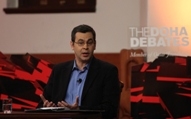
SINAN ÜLGEN
Speaking before me, Ece I think draws the wrong conclusions from the right facts. Because, paradoxically, it's all these democratic shortcomings of Turkey that makes the Turkish model relevant for the Arab world. It is this aspect of a work still in progress, under construction, that makes this model relevant for the Arab world in a way that the Swedish or the Swiss model is not. And there must be a reason why we're sitting here today talking about the Turkish model rather than the Swiss model. My second argument against the motion is that the Turkish model has relevance for the region, not only because Turkey is in the neighbourhood - it is geographically close to this neighbourhood - but also because of the cultural affinity aspect. Namely, Arab people in terms of their cultural affinity have an association with Turkey. They relate to what's going on in Turkey. They relate to what's going on in Turkish society. And I think the best way to prove this argument is just to tell you that the wild success of the Turkish soap operas across the Arab world - from Morocco to Qatar, incidentally - there must be a reason for that. And the reason is that there is an interest that the Turkish model is relevant for the people of the Arab world. My third argument is: let's stop for a second and, instead of us talking, let's listen to what the Arabs say about Turkey. And there, whatever public opinion poll you look at, clearly Turkey stands out as the model. I can give you many, but I'll just give you one example, the latest survey that I've seen, the Arab public opinion poll. Egyptians were asked, `What sort of political system do you want for Egypt?' and the outcome was very clear: 44 percent said Turkey, 10 percent France and eight percent Saudi Arabia. So what better proof is there, besides us here talking on the shores of the Bosphorus about Turkey as a model, than the Arabs themselves championing Turkey as a model - and they do.
TIM SEBASTIAN
Sinan Ülgen, thank you very much indeed. [Audience applause] Turkey's a good model because Arabs like your soap operas? That's a credible argument? [Audience laughter & applause]
SINAN ÜLGEN
I think it's a very credible argument. I think it's a very credible argument because it says a lot about how Turkish society is viewed in that part of the world. TIM SEBASTIAN
TIM SEBASTIAN
'It's fun, it's light-hearted, it's something they haven't had before.' That doesn't mean they think you've got a good societal model, does it?
SINAN ÜLGEN
I think it means that we have a good societal model. I think that the attention, the popularity of those soaps, tell us something about how the Turkish model is perceived in that part of the world.
TIM SEBASTIAN
At what point do these shortcomings, these democratic shortcomings that you talk about, become the model? They are the model, aren't they? Turkey is not moving in the right direction where human rights is concerned, is it? You as a diplomat can see the damage that's been done - the avalanche of reports about freedom of speech being trampled on.
SINAN ÜLGEN
Surely, but this is like this intellectual debate: when you see something working in practice, then you start to ask yourself what..
TIM SEBASTIAN
But it's not very intellectual when you've got so many people in jail, is it? It's very real. It's very down-to-earth, isn't it? [Audience applause]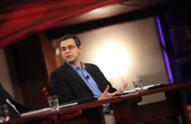 SINAN ÜLGEN
SINAN ÜLGEN
It certainly has practical dimensions, but it's like arguing whether it works in theory while you see that it works in practice. And I think my argument..
TIM SEBASTIAN
Yes, but practically - let's talk about facts, then. Last year alone the European Human Rights Court received nearly 9,000 complaints against Turkey for breaches of press freedom and freedom of expression. That was up from 6,500 in 2009. Which way would you say this model was going?
SINAN ÜLGEN
Surely, but that's the wrong argument to throw at me, because..
TIM SEBASTIAN
Why?
SINAN ÜLGEN
My argument is that it's with these deficiencies that the Turkish model works.
TIM SEBASTIAN
But a lot of people might argue these deficiencies are the model. It's not going to improve. This is the model that's been set.
SINAN ÜLGEN
I would argue on the contrary, because the relevance of the Turkish model and the historical experience that Turkey has had, when you look with a longer timeframe, is that there is vast improvement in terms of both democratic standards and economic standards in this country.
TIM SEBASTIAN
Okay. Sinan Ülgen, thank you very much indeed. [Audience applause] So now could I please ask Hassan Mneimneh to speak for the motion.
Hassan Mneimneh
Speaking for the motion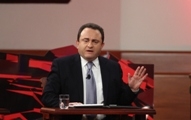
HASSAN MNEIMNEH
Let me say that you do not have to be a critic of Turkey in order to insist that Turkey should not be thought of as the model for the new Arab states. Actually it is because I appreciate a lot of Turkish history and a lot of what has been achieved in Turkey that I would argue, no, it is not a model and no, it is not relevant. Let me start by saying what you do have - I mean, we can use the generic argument that no two histories are similar and therefore people have to seek their own models. Egyptians have to seek an Egyptian model, Tunisians have to seek a Tunisian model. But that does not answer the question, why am I excluding the Turkish model per se? Well, to start with, yes, indeed, you have gone through a period in your history, a period of autocracy that was benign - compare it to the kleptocratic autocracies in the region. You have had to deal with the issue of military hegemony, and you've dealt with it with, I would say, a fair degree of success. Military hegemony is in many places - in Egypt for sure - and it seems to be lasting. Much more important, though, in terms of the lack of its relevance here, you do have a national issue that is still unresolved, not only about the Kurds but also about the Armenian question. Up until that is resolved, I wonder how, in fragmented societies across the region, what do we mean by a Turkish model: do we mean that we are going to once again kind of deal in a non-inclusive way with the national issues that exist? But let me stop here about all this part about assessing Turkey and let me go back into looking at the Turkish model from an Arab perspective. I propose to you that the Turkish model exists only when Turks or Europeans or other Westerners are talking to Arabs - and not just any Arabs but the Arab Islamists. Sinan mentioned something about a poll. I would like the poll to be phrased without mentioning Turkey and France and others. If no mention was there in the poll, I promise you Turkey would not be on the radar of the Arab populations. The..
TIM SEBASTIAN
Would you come to a close, please?
HASSAN MNEIMNEH
Yes. I mean, the main thing to say here is that Arab Islamists are interested in the Turkish model because it gives them a cover for wanting to implement Islamism in their own societies. [Audience applause] 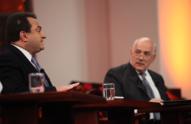 TIM SEBASTIAN
TIM SEBASTIAN
Hassan Mneimneh, thank you very much indeed. Why shouldn't Arabs and new Arab states want the other things that Turkey has, like a successful economy, like huge growth rates, like new cities, schools - some of the things that have been produced in Anatolia? Why shouldn't they aspire to those things?
HASSAN MNEIMNEH
By all means. I'm sure they do aspire, but these Arab..
TIM SEBASTIAN
Well, that's a major part of the Turkish model, isn't it?
HASSAN MNEIMNEH
This is part of any... If economic success was the key issue here, probably the German model would be best in that case. [Audience laughter & applause]
TIM SEBASTIAN
Well, I don't know, but I don't think Germany is an Islamic government yet, is it?
HASSAN MNEIMNEH
Why would the Is...
TIM SEBASTIAN
We're looking at an Islamic government and seeing that it's possible to have runaway growth rates, possible to have the fastest-growing middle class in the Middle East - these are things that they could legitimately aspire to, can't they?
HASSAN MNEIMNEH
As far as I understand it, the Turkish government is a Turkish government, not an Islamic one. It has a party that has Islamic roots, but this is exactly what I'm saying, is the cover that is being used. Islamism..
TIM SEBASTIAN
But you don't know it's a cover. Why is it a cover? HASSAN MNEIMNEH
HASSAN MNEIMNEH
Because it is not mentioned when it is spoken in Arabic. When you have those same leaders that talk about the Turkish model in the English and French press and to Turks and to Europeans. When they're acting in Arab there's very little mention of the Turkish model. Actually in Libya, which was heralded as another one..
TIM SEBASTIAN
And that's proof that the Turkish model is not a good one for the Arab states?
HASSAN MNEIMNEH
That's proof that it's irrelevant. Because the audience..
TIM SEBASTIAN
Whether people misuse it for their own purposes or not, they can still legitimately look at Turkey and say, 'There are a lot of things out there that we like and we want.'
HASSAN MNEIMNEH
Well, by all means. But also there are lots of good things everywhere else. The fact of the matter is it is not as relevant in the Arab sphere as it seems to be when translated into Turkish or French or English.
TIM SEBASTIAN
Okay. Hassan Mneimneh, thank you very much indeed. [Audience applause] Could I now please ask Aboubakr Jamaï to speak against the motion. Thank you.
Aboubakr Jamai
Speaking against the motion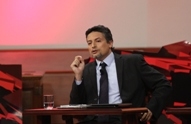
ABOUBAKR JAMAï
Okay. Let me preface my two minutes by saying the following. I'm a journalist who has been kicked out of his country because of his opinions, so it's very hard for me to take as a model a country which has note of 100 journalists in jail. That is to say that it's a flawed model but it's still a model. I'm going to try to convince you why it is a model. The biggest impediment to democracy in our countries - I'm a Moroccan, a Southern Mediterranean country - was that there is no way to get rid of these authoritarian regimes because then you will end up with some crazy Islamist Taliban Sharia-touting laws and governments. And in that respect, if only in that respect, Turkey has been a model because it showed that you can have a party which considers itself - or has originated in some Islamist ideology (although not only the AKP but all of them now say that they're conservative - they don't like to be labelled Islamist, but yet). And it's functioning - it's functioning. So that has destroyed this wall of fear, has destroyed this important argument that we had in our country. And it is an important dimension. Why? Because when you say that this is a flawed model, you should also think in terms of alternatives. The alternative in our countries was Mubarak was Ben Ali and still is, unfortunately - the monarchy we have in Morocco. So it is a flawed model, but it is a model. Secondly, I think there is a very important aspect: that is that this Turkish flawed democracy seems to be functioning well economically speaking. And it seems to be functioning well economically speaking because improvements have been made in terms of governance. When you look at your governance indicators, the World Bank governance indicators for Turkey, they have improved in terms of fighting corruption. And to see that a country which has been able to accommodate an Islamist party as its leading party and at the same time be able to promote a well-governed economy, to me is good enough to be a model.
TIM SEBASTIAN
All right. Thank you, Aboubakr Jamaï. Thank you very much indeed. [Audience applause] A flawed model is a bad model, isn't it? Shouldn't you be on the other side?
ABOUBAKR JAMAï
Well, then we should..
TIM SEBASTIAN
You admit it's a flawed model.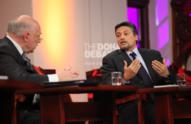 ABOUBAKR JAMAï
ABOUBAKR JAMAï
Yes. Then we shouldn't be talking about a model at all. We're talking about two different societies.
TIM SEBASTIAN
But we are for the purposes of this debate.
ABOUBAKR JAMAï
This is social sciences. We're not talking physics, we're not talking cars; we're talking human beings.
TIM SEBASTIAN
Yes. Yes.
ABOUBAKR JAMAï
And by definition there is no model when you speak in terms of countries.
TIM SEBASTIAN
And you acknowledge that, whether it's the model itself or the way it's being implemented, is not very successful, is it? Especially when it comes to your field, journalism.
ABOUBAKR JAMAï
Yes, absolutely. By definition, yes.
TIM SEBASTIAN
Where Turkey is rated as 138th in the Freedom Index from Reporters Without Borders. 138th in the world, just above Ethiopia and Russia.
ABOUBAKR JAMAï
Yes, this is egregious, absolutely. I'm not denying that. What I'm saying is it is a flawed model. All models by definition in terms of human societies, nation states, is an evolving one. And secondly it is something ....
TIM SEBASTIAN
Yes, but the question is where it's evolving - is it going backwards or going forwards?
ABOUBAKR JAMAï
Well, I do believe it's going in the right direction. That's my deep belief. I hope not to be here...
TIM SEBASTIAN
You admire Turkey's free market policies. Do you also admire the fact that huge swathes of the Turkish economy are considered grey or black so no taxes are paid?
ABOUBAKR JAMAï
Well, I do...No, it's not... No, no, no, that's not what I said. I said governance has been improved, corruption has been fought.
TIM SEBASTIAN
Evading taxes, under-reporting sales and wages, failing to register employees for social security. This is from the Financial Times.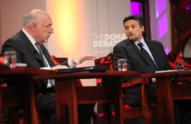 ABOUBAKR JAMAï
ABOUBAKR JAMAï
Well, okay. If you've been... Well, I'm comparing what is considered by the Arabs and Muslims as being a valid model because as Sinan has said before, if you talk about the Swedish model you're inaudible. You need to be...things.
TIM SEBASTIAN
But what is valid about the model where less than four percent of the working age population pay personal income tax - what is valid about that as a model? How's that going to work in future?
ABOUBAKR JAMAï
Well, again, I didn't say that economically speaking it was an ideal model. What I said is that the fact that it has been more and more democratised led to a better economic governance, not the best form of governance.
TIM SEBASTIAN
You mean you're saying less corrupt rather than more democratised? You're saying less corrupt?
ABOUBAKR JAMAï
Yes, that's what I'm saying.
TIM SEBASTIAN
But in a survey of - Transparency International survey in 2010, more than 30 percent of Turkish households that were surveyed perceived public officials to be extremely corrupt.
ABOUBAKR JAMAï
I just looked up the scores. The Turkish Transparency Index was 3.2 in 2002. It is now 4.2.
TIM SEBASTIAN
It's still in the Seriously Corrupt category.
ABOUBAKR JAMAï
Corrupt, but not seriously. There is an improvement - that was my point. There is an improvement.
TIM SEBASTIAN
Okay, all right. Aboubakr Jamaï, thank you very much indeed. [Audience applause]
TIM SEBASTIAN
Okay, we're going to now turn it over to your questions. Our motion is that `This House believes that Turkey is a bad model for the new Arab states.' We'll take the gentleman in the second row. If we just wait to get a microphone to you, please.
Audience questions
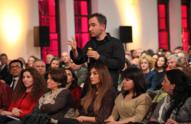 AUDIENCE (M)
AUDIENCE (M)
The question is - I'm asking this question to Ece. I agree with most of the criticisms you have towards the police and the judiciary. Is this something that the AKP created, or is this the classical authoritarianism of the Turkish state that the AKP should be criticised for not reforming? But aren't these the old tools of a state which was always authoritarian and which was actually even worse, like ten years ago with all the systematic torture, which is not here today?
ECE TEMELKURAN
We don't know that. We don't know that, because..
AUDIENCE (M)
Oh, you know something about it?
ECE TEMELKURAN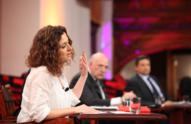 No, we don't know that, because the letters which have been written in the jails cannot get out any more. Because as a columnist I was among those who, the political arrested people are not allowed to write letters. So we don't know if there is torture in the jails or not, firstly. Secondly, the cruelty of this government has been all around the place. Of course, not all around the place, because nobody's allowed to write about it. But everybody who's on Twitter or on social media is talking about this already. And there are ridiculous cases, as you very well know, for Cihan Kurmizigen, who just wore a kafir and got arrested, and he has been in jail for like months..
No, we don't know that, because the letters which have been written in the jails cannot get out any more. Because as a columnist I was among those who, the political arrested people are not allowed to write letters. So we don't know if there is torture in the jails or not, firstly. Secondly, the cruelty of this government has been all around the place. Of course, not all around the place, because nobody's allowed to write about it. But everybody who's on Twitter or on social media is talking about this already. And there are ridiculous cases, as you very well know, for Cihan Kurmizigen, who just wore a kafir and got arrested, and he has been in jail for like months..
TIM SEBASTIAN (to questioner)
Okay, do you want to come back on this?
ECE TEMELKURAN
.. or other people as well who are labelled as terrorists and who are living in the prison without a single hearing for even years.
AUDIENCE (M)
Yes, I'm saying you're right. I'm just saying this has been this case this way for ever. But the people who are now feeling threatened about this were safe before, because they were the secular elite. Now they're getting the heat, and I'm with them. But the Turkish state has never been any better. I think it's better than it ever was. But it's still not great.
TIM SEBASTIAN(to questioner)
And that's good enough, is it?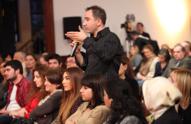 AUDIENCE (M)
AUDIENCE (M)
No, it is very bad. But I think that's why Turkey is not a model: because of its security forces or because of its judiciary, which is very bad, both. AKP is a model for the Islamists of the region. And .....
ECE TEMELKURAN
No, AKP is not a model. And let me tell you why it's not a model. Because before AKP, before this party coming to power, we knew who the bad guys were, who the good guys were. When there were generals who were directing this country, who were in the administration or anything, we knew that those were the bad guys. But this cruelty has been practised under the name of democracy - and even worse, legitimate democracy. This worsens the situation in Turkey.
TIM SEBASTIAN
Okay. Sinan Ülgen, you want to come in here.
SINAN ÜLGEN
So far I think there's an inconsistency in your argument. Because what you say is that AKP is a model, but let's not forget that AKP is a by-product of the Turkish system of democracy. So in a way, one of the core features of the Turkish model is how Turkey has been able to accommodate the rise of political Islam in a formally democratic pluralistic setting. So just saying that AKP is a model and Turkey is not, I think there is an inconsistency there. If AKP is a model, then Turkey and its democratic structure is also a model.
AUDIENCE (M)
Well, your point there - I'm saying that the Turkish multi-party system, which is here since 1950 despite all the coups we had, is a model which has created the AKP. And it's not me - it's people like Rached Ghannouchi in the Arab world who says AKP is a good model. So, I mean, we're not imagining it: Islamists of the region who want to reform themselves based on their past are saying this.
TIM SEBASTIAN
Okay. Hassan Mneimneh.
HASSAN MNEIMNEH
He's saying it to you; he's not saying to his base.
AUDIENCE (M)
I appreciate that too.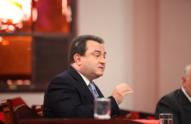 HASSAN MNEIMNEH
HASSAN MNEIMNEH
His base does not hear that, and actually his ideologues - even more important than the base - not only do not hear that; the Islamist ideologues in the region think that they are a model for the AKP. The AKP is restrained by a history of excessive secularism. Sooner or later that excessive secularism will loosen, and the Islamist model that they promote will come to Turkey. It's not the Islamist model from Turkey coming to them.
AUDIENCE (M)
It is right that Ghannouchi has inspired AKP and the beginnings of the AKP in a very positive way. Ghannouchi was the Arab thinker who was speaking about compatibility of Islam and democracy while other Islamists were condemning it. So there has been an interaction between these parties - Turkish Islamists and Arab Islamists. And I think AKP has proven that a party with Islamists roots can be compatible with a secular state. That secular state has been authoritarian for eighty years. Unfortunately it still is. And AKP is still using their old tools, and it should be criticised for that. But I think AKP's own transformation to post-Islamism is a value which is, I think, meaningful for the Arab Islamist party state.
TIM SEBASTIAN
Okay. Aboubakr Jamaï, a brief comment, and then I'm going to move on.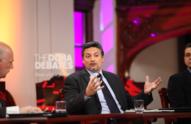 ABOUBAKR JAMAï
ABOUBAKR JAMAï
Actually Islamist parties in our region of the world - and I speak of Morocco, which is pretty much on your map, but I think it's worth looking at - we have two Islamist parties, one banned, one authorised, and both of them have claimed in Arabic, in Amazigh, the Berber language we have, and in French, that Turkey was a model. And Turkey, not necessarily AKP, I think, there might not be...
TIM SEBASTIAN
AKP being the ruling party, of course. Okay. I'm going to take a question from the lady in the row over there, with the red scarf. 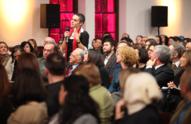 AUDIENCE (F)
AUDIENCE (F)
What I'm hearing from this side, that's saying that Turkey is a good model for the Arab world, what I'm hearing: I'm a Turkish citizen, but if I had been an Arab citizen I would have felt very offended. It sounds like this bon pour l'Orient - ‘good for the Easterners', what you're suggesting there. And I find that perspective very humiliating for the..
TIM SEBASTIAN
You find it condescending, do you?
AUDIENCE (F)
Exactly. Exactly. And especially what we're observing in Egypt, at Tahrir, it first started with demanding the resignation of the Interior Minister, then the demand changed to the resignation of Mubarak. Then Mubarak actually resigned, and a military administration came. But the people, that was not enough for them. And at that point I started really strongly respecting the Egyptian people. Despite the violence they'd shown to the demonstrators, they were striving for more.
TIM SEBASTIAN
Okay. Do you have a question?
AUDIENCE (F)
So what I'm saying is: if you're arguing for this by saying that this is enough for the Arabs, it's the most humiliating thing you can say. And I'm saying this as a Turkish citizen. SINAN ÜLGEN
SINAN ÜLGEN
If I were sitting here and arguing for the Swedish model, how many of you would be here listening to me? In other words, yes, Turkey - and this has been stated - has its flaws. But all models have their flaws. And again, the democratic deficit that Turkey has is not the core component of the Turkish model; it's only one of the components of the Turkish model. The Turkish model is about more - it's also about building a vibrant democracy; it's also about reforming civil-military relations; it's also about linking with the rest of the world. So Turkey has a number of different features that today combine, interact, to form the Turkish model. Democracy is a very important one, but it's only one of those features.
AUDIENCE (F)
It's a very critical feature. We suffer under this lack of a true democracy. We have a 10 percent barrier when we vote. Since 1983, after the military coup, when we started a pseudo-democracy, we are forced to vote under a 10 percent barrier so any party that cannot pass this wall cannot be represented in parliament. A lot..
TIM SEBASTIAN
Cannot hold a single seat in parliament without reaching the 10 percent threshold.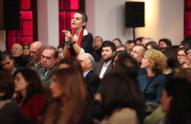 AUDIENCE (F)
AUDIENCE (F)
Exactly, not a single seat. And since 1983 we have the 10 percent. You're talking about the Swedish model. How about Brazil? Brazil, I think, democracy-wise is much better. And this is a new, upcoming country. So let's forget about Sweden. I don't think that Sweden is actually going the right way anyway - they're also turning into neo-liberals or...
TIM SEBASTIAN
Okay. Hassan Mneimneh, do you want to come in there?
HASSAN MNEIMNEH
Let us make it very clear: when the word `Turkish model' is used in an Arab context, it does not mean institutional democracy. It does not mean procedures. It does not mean an independent judiciary. When it is used in an Arab context by Islamists, it means: `Allow us as Islamists to be part of government,' period. [Audience applause] Regardless of the content of the program that is being presented: in context in which the Islamists feel threatened - such as in Morocco, because they have to pass certain criteria - well, they're incorporated. But again, I ask you not just to look at how they speak to their base but what their ideologues are saying. Their ideologues do not think very highly of the Turkish model, because it's not Islamic enough.
TIM SEBASTIAN
I just want to go back to the questioner and ask her whether she thinks the Islamists are also trying to pull the wool over people's eyes in the Arab world.
AUDIENCE (F)
Yes, I do think so. Could you please repeat your question? I'm not sure I understood correctly.
TIM SEBASTIAN
I'm just following up on what Hassan Mneimneh said: that he thinks that the Islamists are just saying..
AUDIENCE (F)
In the Arab world? Yeah, yeah.
TIM SEBASTIAN
Yes, in the Arab world - are just trying to use Turkey as a cover for getting a place in government.
AUDIENCE (F)
Yes, I agree. This is also my sensation.
TIM SEBASTIAN
Okay, all right. Let's take another question. Lady in the second row there, please. 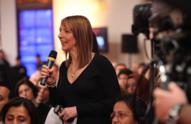 AUDIENCE (F)
AUDIENCE (F)
Well, I guess, leading on from what you've just said, the question is to Sinan: can an Islamist party be democratically minded? And where does that leave the Turkish model? And therefore is this a model that other countries should aspire to democratically?
TIM SEBASTIAN
Sinan Ülgen, that's your argument, isn't it?
SINAN ÜLGEN
Exactly. And an additional element in that argument is that we are still striving to create a better system of governance and democracy in this country. That does not eliminate the model value of Turkey for the whole region. Because when you look at what other alternatives are out there - and you know that other country very well: Iran - is Iran the other model that we can talk about constructively for the future of the region? So despite all its flaws - and we've talked at great length about all its flaws - Turkey remains the model. And again, it's the Arabs themselves that are saying this. Look at every public opinion poll: it comes out clearly that Turkey is the sole credible model.
TIM SEBASTIAN
Why, why..
ECE TEMELKURAN
I've been through some countries in the Arab world, and the most known thing is: `Our prime minister is saying one minute, and the Muhannad,' which is like a TV soap opera. Other than that, what do they know about Turkey? And how could they know about Turkey anyway? Nothing goes out from this country. And by the way, even in the Foreign Ministry not many people know Arabic. Relations between Turks and Arabs are so weak, already throughout our education system we always had this Arab racism underneath the curriculum; it's always there and there is huge Arab racism in this country. So they wouldn't turn their faces to Arabs. It's so near them that they wouldn't turn their faces to Arabs and take them seriously and talk with them anyway. And Arabs cannot know anything, because only our cultural garbage is going to them and nothing else.
TIM SEBASTIAN
Okay, let me come back to the questioner. Where do you stand on this?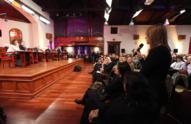 AUDIENCE (F)
AUDIENCE (F)
Well, I mean, we were not talking about Iran; we're talking about Turkey. And there is clearly an anti-democratic movement underway here. I've lived here for ten years: I've seen three terms of AK Party government, and there is a crackdown on dissent. This is very clear. Colleagues, journalist colleagues of mine say that they live in fear. They practise self-censorship. Many of whom are in prison. Ece lost her job for this. Women's rights are backsliding. There are many issues here that are representative of an anti-democratic movement. So the question is: where does this leave the Turkish model? We have free and fair elections, but this is almost a majority rule that's developing. Three..
TIM SEBASTIAN
Okay, all right. Aboubakr Jamaï, come in on that.
ABOUBAKR JAMAï
I'd like to speak to this argument that the Islamists are not sincere, that they..
TIM SEBASTIAN
Could you speak to just what the questioner brought up here.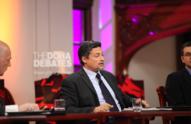 ABOUBAKR JAMAï
ABOUBAKR JAMAï
Yes. But this goes to the root to what you just said before, in your first intervention. I'm tempted to say okay, they want the Turkish model simply to have the possibility to arrive at power. So what? So what? Because the question is not if they are themselves democrats; the question is do we have a democratic system that will accommodate a variety of views and put a rein on people who are not necessarily democratic? And that's what Turkey is battling with. Answering your second question - and I agree with the lady who talked about the threshold for voting, etc. - I think this is a serious problem. I think the problem of AKP is not that they are Islamists; it's that they win too much too strongly, and that any political party that is put in such a situation at some point will end up developing some authoritarian instinct. And I see that more of a problem. But it's still for us a flawed model but valid model, because it's the closest to us from a cultural standpoint, struggling with democracy and having some clear, I think, and serious democratic rules to govern its politics.
TIM SEBASTIAN
Okay, there's a questioner at the back. Gentleman there - you have your hand up.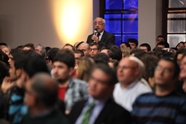 AUDIENCE (M)
AUDIENCE (M)
I think if we have to take our country with a number of Muslims as an example for Arab countries, maybe the country with the highest number of Muslims should be the model. I'm talking about India, where there are a lot of Muslims: they are struggling for democracy, and they have been doing everything under democratic rule since 1947. I think it's a very good model, and Islam is the reason.
TIM SEBASTIAN
A much better model than Turkey?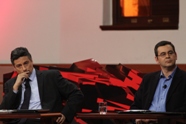 AUDIENCE (M)
AUDIENCE (M)
I think so. I live there, so I think it's a much better model than Turkey. And don't forget that our prime minister once said democracy is a tramway which we will jump out when we arrive at our destination. And I hope that the Arab countries won't do that.
TIM SEBASTIAN
Aboubakr Jamaï, you want to comment on that.
ABOUBAKR JAMAï
No, I thought you would say Indonesia, actually, because it would be even more valid because they have a majority of Muslims, which is not the case in India, which is a democracy.
AUDIENCE (M)
I'm not saying the majority - I'm saying the number of Muslims.
ABOUBAKR JAMAï
But I mean, words are words but also opinions are opinions, and clearly the one poll that Sinan has mentioned is very clear on the fact that Turkey is looked up at as some kind of a model. And Erdoğan, let me tell you the reason why Erdoğan has become the most admired leader in the Arab 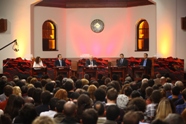 world. I think everybody knows why: the same reason that Nasrallah at some point was the most admired one, then King Abdullah at some point, etc. Jacques Chirac even at some point. It's because of his stance with Israel. That's what made him..
world. I think everybody knows why: the same reason that Nasrallah at some point was the most admired one, then King Abdullah at some point, etc. Jacques Chirac even at some point. It's because of his stance with Israel. That's what made him..
TIM SEBASTIAN
Because he's bashed Israel, is it?
ABOUBAKR JAMAï
Yes, because he showed some dignity in dealing with Israel contrary to many other Arab leaders.
ECE TEMELKURAN
Erdoğan is one of the most loved men in the Arab world because he stands against Israel? You really  think that? You think that Arabs don't watch the news?
think that? You think that Arabs don't watch the news?
ABOUBAKR JAMAï
No, I think that's the reason. But really the question... Let me finish. Let me finish. Let me finish.
TIM SEBASTIAN
No, please don't both speak at once.
ABOUBAKR JAMAï
I'm trying to be as sincere and truthful as possible. But when the questioner asked about the Turkish model - and you've mentioned the 44 percent of Egyptians who are thinking that the Turkish model is the best one, it was not about Erdoğan; it was about the model. So it still means something.
TIM SEBASTIAN
Okay. Ece Temelkuran.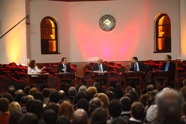 ECE TEMELKURAN
ECE TEMELKURAN
No, there is this inconsistency thing. We cannot judge systems or political parties according to their sincerity or anything, because it's not an emotional relation. We judge them on their consistency. So when it comes to Israel or standing for the Palestinian cause or something, I think this is one of the most inconsistent governments Turkey has ever seen. Because after the flotilla incident happened there was a message from the other side of the ocean, from Fethullah Gülen saying that this flotilla shouldn't have gone there because it was uprising against authority, and Israel should approve it before you go, to have the Gaza people. And then nothing has happened. And then this government signed an agreement with the Americans about the missile thing against Iran. So it's like this inconsistent thing happening all the way. When you need popularism for Arab streets, you go and say one minute in Davos, and then when it comes to real politics it's something different. And Arabs know that, by the way.
TIM SEBASTIAN
Okay. The questioner over there is still holding onto the microphone. Did you want to come back on this? Brief comment, please.
AUDIENCE (M)
Yes, I just want to say - the brief comment I want to make about the soap operas: Turkey was the fond of Brazilian soap operas, but we never adopted their system, so I don't think that soap opera really works. [Audience applause]
HASSAN MNEIMNEH
Yes, you have a point there.
TIM SEBASTIAN
Hassan Mneimneh.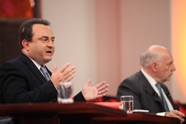 HASSAN MNEIMNEH
HASSAN MNEIMNEH
You have a point there, because actually Mexican soap operas were very popular in the Arab world, [Audience laughter] but they were judged to be a little bit too racy. The Turkish ones are a little bit more tame, and this is why I think they have wider appeal, especially in the Gulf. But I'd like to put the whole business of polling to rest. Thanks to a Mubarak regime that has insisted on not having any political awareness or education, any poll that you conduct today is a poll about affinity. When you give me a choice as an Egyptian between France, Brazil and Turkey, I have the most affinity with Turkey because they happen to be Muslims. If you add Iran to that, I would still choose Turkey because they have happen to be Sunni. It is not a judgement about the model, it's not a judgement about the politics. Actually, Ece said it right. The Egyptians, the Tunisians, the Arabs in general know next to nothing about Turkey. All that the Arabs know about Turkey is through soap operas that transmit an image of Turkey that is completely unreal, as you know.
TIM SEBASTIAN
Okay. Well, you've made that point. I'd like to ask whether there are any Arabs in the audience who'd like to come back to you about that. Are you an Arab? Okay, please say something, then.
SINAN ÜLGEN
Can I also react to this?
TIM SEBASTIAN (to questioner)
Where are you from?
AUDIENCE (F)
Egypt.
TIM SEBASTIAN
Please go ahead.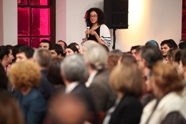 AUDIENCE (F)
AUDIENCE (F)
Well, actually I think the major question is really just about alternatives. Because, well, first of all, we do talk about the Turkish model in Egypt. It might not be a very pleasant thing. Even like I'm not really taking sides. But the fact of the matter is it's really like it's one of the options on the table. For example, India's not on the table - no one really talks about India as a model. So it's not really part of the discourse. If you just like come one day..
TIM SEBASTIAN
Okay, deal with Turkey and the accusation that you as Arabs know next to nothing about it. Is that true?
AUDIENCE (F)
Well, I happen to study International Politics, so I can't really say that I don't know much about Turkey. But it's just that I think the problem is it's just a matter of alternatives. Like, for example, Copts in Egypt. At one point in the parliamentary elections they chose the ikhwān, the Muslim Brotherhood, because the other alternative was the Salafis. And when the discourse is becoming so conservative back home and when you're really choosing between the Turkish model - or, without really saying it, the Saudi model - the Turkish model kind of, even for the secular people, just looks a bit more cheerful, actually.
TIM SEBASTIAN
Okay, so is it the best of the alternatives out there?
AUDIENCE (F)
In a sense, I guess, well, so far of the alternatives that were being offered in the discourse, yes.
TIM SEBASTIAN (to questioner)
By default, you're saying? Okay, all right.
AUDIENCE (F)
Well, yeah. It might be unfortunate, but that's the case.
TIM SEBASTIAN
Okay, let's hear from another Arab.
ECE TEMELKURAN
It looks cheerful from the outside, like from this campus, but..
TIM SEBASTIAN
Okay, can we hear from another Arab in the audience? Yes, over there. Yes, you, sir. Thank you very much.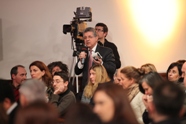 AUDIENCE (M)
AUDIENCE (M)
Thank you. I'm a former Syrian ambassador to Sweden. Now I am with the opposition. The reason why I'm telling you who I am is to know how relevant the topic of discussion is to me. First of all, I would like to address the gentleman there, that you really...
TIM SEBASTIAN
We have three gentlemen. Which one would you like?
AUDIENCE (M)
I'm saying there.
TIM SEBASTIAN
Okay, this one. Hassan Mneimneh.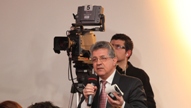 AUDIENCE (M)
AUDIENCE (M)
I appreciate what you said, but I'm sorry you made an insult to us when you say we don't know Turkey - we know only the soap operas. That's not true. We have lived with Turkey 500 years, so that's long enough to learn a lot about Turkey. Also we have a common culture with Turkey. What is relevant to us with the Turkish experience are four main things. First of all, they ended the military rule, which is very relevant to us. They ended the corruption to some extent, but this extent is enough for us because we are drowned in corruption. And they turned to democracy with ending the military rule. Now, one more important thing is the Islamic party, which has been able to accept secularism within its policies - and this is an issue which perhaps in Syria is very relevant. Because we have the majority not Islamists but Muslims, but there is also a great deal of people who are secular in one sense or another.
TIM SEBASTIAN
Okay. Hassan Mneimneh, I want you to come back on that.
HASSAN MNEIMNEH
Yes, I'd like us not to be romantic about it. It's not a matter of 500 years. Ece mentioned anti-Arab racism in Turkish curricula. I would venture to tell you that the vilification..
TIM SEBASTIAN
Never mind in the length of time, but deal with the issues that he raised. 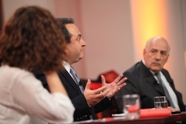 HASSAN MNEIMNEH
HASSAN MNEIMNEH
Exactly. The vilification of the Ottoman Empire is part and parcel of what makes Arab nationalism itself. It is anti-Ottoman. Now, all the issues that you mention Turkey succeeded in doing because of Europe. Let us be frank about it. If there has been..
TIM SEBASTIAN
But it did succeed in doing. Whether it was Europe or whatever.
HASSAN MNEIMNEH
Well, yes. It succeeded to some extent, but the issue here: there is no Europe impetus. No one is offering any of these states to join the European Union, for them to try to evolve internally. And therefore all the incremental successes, which remain incomplete, the impetus was not from an ideology that combined Islam and democracy; it was from a prospective union, a prospective joining of the European Union. And therefore I'm saying it is all good. I appreciate. This is why I said. It is not being critical of Turkey; I'm simply saying that the Turkish model is irrelevant in the Arab world. The Egyptian model..
TIM SEBASTIAN (to questioner)
Okay. You're not convinced by what you've heard? Let him come back, please.
AUDIENCE (M)
I don't see why you segregate democracy and Islam. There is a very important saying in Islam: Amruhum Shura Baynahum: `They have to consult among themselves.' This is the first form of democracy, that was founded 1,400 years ago. So your separation is academic. In practical terms it's not true.
HASSAN MNEIMNEH
[Shaking head] No.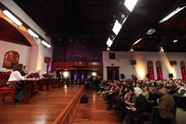 ECE TEMELKURAN
ECE TEMELKURAN
I'd add something to that.
TIM SEBASTIAN
Very briefly. Ece Temelkuran.
ECE TEMELKURAN
If you really know about Turkey or the Turkish system, whatever, I'm sure - and this is the most relevant thing about Syrians, I think: you know how Turkey deals with its minorities, especially Kurds. We just recently had a massacre in Uludere, where 35 people were bombarded, civilians were bombarded.
AUDIENCE (M)
...the massacre that's going on this year.
ECE TEMELKURAN
And 19 were kids aged between 12 and 17. So can you adopt such a model in Syria and watch the massacre that would come up?
AUDIENCE (M)
That's exactly what I am saying. [Audience applause] I am not saying it's the perfect model, but at least it's relevant to us as a first step perhaps for later. Because you cannot bring a Swedish model into Syria immediately; you have to go gradually about it and..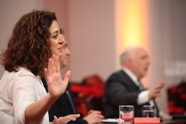 ECE TEMELKURAN
ECE TEMELKURAN
Yeah, this `work in still progress' argument is quite, you know, strong now, and I don't want to see this `mission accomplished' part.
AUDIENCE (M)
Just a last word, please.
TIM SEBASTIAN
Well, just have one last word, and then I'm going to move on.
AUDIENCE (M)
Just one word. I want you to know that this anti-Ottoman thing and Arabism has finished. The Arabism in the Arab world has finished. It proved to be unsuccessful. So now people are going back to Islam again. Thank you.
TIM SEBASTIAN
Okay, all right. There's a gentleman in the centre there. 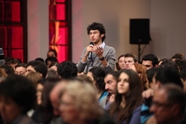 AUDIENCE (M)
AUDIENCE (M)
My question is directed to the proposition bench about: okay, in this debate I heard the opposition bench model: it's Turkey. But what is the alternative model that won't make the pressure on the media in the Islamic world or provide an independent judicial system in the Arabic world? What is your model for achieving a system better than Turkey's? I really want to hear a clear model about this debate.
TIM SEBASTIAN
Okay. Ece Temelkuran.
ECE TEMELKURAN
Good old democracy. What could it be? Good old democracy, of course.
TIM SEBASTIAN
I think he was looking for a country. Were you looking for a country?
ECE TEMELKURAN
Oh, a country. Are you looking for a country? No. No country at the moment can be a model, I think, in terms of democracy.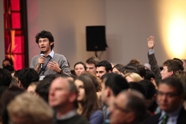 AUDIENCE (M)
AUDIENCE (M)
How can you ensure that the Islamist movements or fundamentalist movements in an open democracy do not take the system and do not prevent the improvement of democracy then? How can you ensure that?
ECE TEMELKURAN
It's not our job to ensure that, actually. Our job is to ensure that everybody has equal representation and they have equal rights to access to a political system, to democratic representation. This is what should be ensured. You know, it's not our job to stop Islamists coming to power. That's not the point, I think.
TIM SEBASTIAN (to questioner)
You want to have the microphone back? Let me just ask you how good a model do you think Turkey is?
AUDIENCE (M)
I don't think it's a perfect model, but I don't believe that in the Arabic world democracy just works fine as in Europe or in the other modern democracies. That's my question.
TIM SEBASTIAN
So you think it's the best one around, do you? You think it's the best one available?
AUDIENCE (M)
Yes. It's not the best in the world, but it's best for the Arab world.
ECE TEMELKURAN
I have been in Tunisia for the..
TIM SEBASTIAN
Let me just bring in Hassan Mneimneh.
ECE TEMELKURAN
Sorry.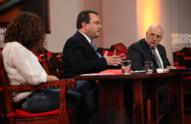 HASSAN MNEIMNEH
HASSAN MNEIMNEH
It's a little bit confusing to me. How do you propose to take whatever is the Turkish model and implement it in those various countries? Why not in that case simply implement the proven tried and true methods of checks and balances, democratic procedures etc.? Why label it Turkish, and what's particularly Turkish about it? All the facets, all the aspects of the Turkish democratic model that I've heard have pros and cons. If we're selecting the pros, so why label it Turkish? We go for the known democratic models, the known democratic procedures, and we implement it incrementally.
TIM SEBASTIAN
Okay, all right. Sinan Ülgen, comment, please.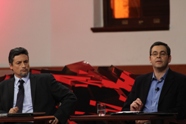 SINAN ÜLGEN
SINAN ÜLGEN
Well, there's a very simple reason why those countries and people are looking up to the Turkish model: it's that it is a practical agenda for implementing all that works and all that has worked in this country. So in a sense, yes, we can talk theoretically about having the best democratic governance in those countries - but how are we going to get there? That's the solution provided by the Turkish model - and not only in terms of democracy but it's also about how you build a sound, comprehensive economic system. It's about how you normalise the civil-military relationship, and how all these different core features interact, among others. So it's all about the mechanics of how you go about implementing good governance, rule of law, democracy in a sound, vibrant economic community.
TIM SEBASTIAN
Where is the good governance when students who put up a sign asking for free education are put in jail for months? I mean, where's the good governance there? [Audience applause] Or this is just a shortcoming, is it?
SINAN ÜLGEN
It's certainly a very serious shortcoming, but again, when we talk about a Turkish model..
TIM SEBASTIAN
But it starts to define the state, doesn't it? It starts to define the state and the government.
SINAN ÜLGEN
Yes, but let's look at it from a time perspective. I mean, the Turkish model is not..
TIM SEBASTIAN
Is there a yes, but after that? Is there a yes, but after you've just said yes?
SINAN ÜLGEN
Of course there is a yes, but. Let's look at the Turkish model.
TIM SEBASTIAN
If it defines it, that's the model, isn't it.
SINAN ÜLGEN
It does not define it. It's an exception to the good..
TIM SEBASTIAN
You just said it does, `but'.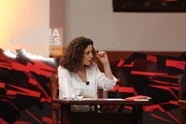 ECE TEMELKURAN
ECE TEMELKURAN
It's not an exception. Excuse me, it's not an exception. I have got here names that I have to mention in this program, and none of them is an exception. I'm sorry. Büşra Ersanlı and Ragıp Zarakolu, most of you know here, they were rejected when they asked for a typewriter in the prison. One of them is a prisoner and one of them is a professor and one of them is a publisher. And Cihan Kumizigen I mentioned earlier. Or Dogan Yurdakal: he wasn't allowed to see his wife when she was dying of cancer, and he's an arrested journalist. And Metin Locumju , who choked to death because of the teargas, and our prime minister just said, `What can I do?' These are not exceptions. [Audience applause] I'm sorry.
TIM SEBASTIAN
Sinan Ülgen.
SINAN ÜLGEN
Yes, but I don't want to be put in a position of defending the anti-democratic practices of the government, but I fully believe that this is a period that Turkey will overcome, because the trends are in a good direction. When we look at what Turkey has accomplished since 1923, it has relevance for the region.
TIM SEBASTIAN
At what point, in your eyes, do those shortcomings negate the model itself? At what point?
SINAN ÜLGEN
It negates the model itself when there starts to be a serious and legitimate question about the legitimacy of the government. And we're not there.
TIM SEBASTIAN
Okay. All right. Gentleman in the third row.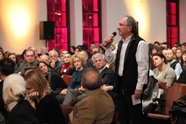 AUDIENCE (M)
AUDIENCE (M)
If the Turkish model is so good for the Turks and the Arabs, how come the Turks themselves are trying to adopt the EU model? Number one. [Audience applause] Number two..
TIM SEBASTIAN
Let's have an answer to that one. Let's have an answer to that one.
SINAN ÜLGEN
Well, we're not trying to adopt the EU model. There's no EU model as such. There are 27 member states in Europe, and they have a shared sovereignty. So in some areas there is the EU governance; in some others there aren't. But definitely we're part of the European nations, and therefore we have been influenced throughout history, and that influence unfortunately has died down in later years, but nonetheless that has been a dynamic that has shaped the Turkish model that is out there.
TIM SEBASTIAN
Okay. Aboubakr Jamaï, you wanted to comment.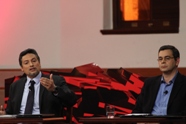 ABOUBAKR JAMAï
ABOUBAKR JAMAï
I think it's important to restate what I said in the beginning. That is the alternative, and it still is, for example, in Morocco and now even in Egypt: that the idea of authoritarianism remaining is justified by the fact that the alternative would be some crazy Islamist government. This definitely Turkey has overcome, and in this perspective it is a model. So it is important to keep that in mind. You mentioned the EU - I'm very glad that you did. One of my dreams is that the EU impose on Morocco in the advance steps - because Morocco's given advance steps - the same conditions imposed on Turkey in terms of respecting the Copenhagen criteria. I would like to see that. And in that, I think, it is also a model in its relation vis-à-vis the EU. I'd like to see the EU treating the Arab world in terms of democracy and human rights criteria the way that they're treating Turkey.
TIM SEBASTIAN
Do you want to come back on that?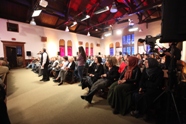 AUDIENCE (M)
AUDIENCE (M)
Yes, if I may. I thought that there was lot of heterogeneity in the European context, but obviously they're being very homogenous when it comes to Turkey. Don't you should think so? And number two, I want to go back to this business of soap operas, if I may. To my knowledge, the Turks themselves like a lot Brazilian soap operas. So if soap operas are subtitled criteria to adopt a system, that means that, at least in the context of soap operas, we Turks are proceeding in the direction of Brazil, which means that probably the Brazilian model is not all that bad after all.
ABOUBAKR JAMAï
I think it's unfair to bang on this opera thing over and over again. It was one of the many arguments, and there were other arguments that were more, I guess, sustainable in the discussion than this one. So...
TIM SEBASTIAN
Okay, all right. I'm going to take another question. Gentleman over there.
AUDIENCE (M)
Hi, everyone. Firstly, I want to say that before AKP we couldn't criticise the military, because when you criticised the military you were [put] in prison. And now with AKP we cannot criticise AKP, or especially Tayyip Erdoğan - and I know maybe after this debate I will be in prison, but it doesn't matter. So...
TIM SEBASTIAN
Well, there may be a few who are with you, then, as well. [Audience laughter] You probably won't be alone.
AUDIENCE (M)
Probably. But, as I know, in democracy we develop by criticising. If there is something wrong, you criticise and you try to develop. But with AKP they do not accept. They said that `We are the only power,' like Ottoman. So they are trying to be like Ottoman and (?) tried to be the party shah or the sultan, but he says president.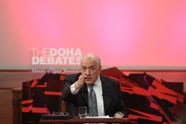 TIM SEBASTIAN
TIM SEBASTIAN
Okay, so what is your point?
AUDIENCE (M)
So my point is Turkey cannot be a model for the Arab world, because Ottomans were the one power with Arabs and they have experienced already these things. That's why I'm saying. Did you like Ottomans?
TIM SEBASTIAN
Aboubakr Jamaï.
ABOUBAKR JAMAï
That's not exactly my choice, you know, that I'm not forced to call back the sultans of the Ottoman Empire to govern me - which they never did, as a Moroccan, by the way. The Ottoman Empire never reached Morocco. There are two stories about it - there were two.
TIM SEBASTIAN
Yes, but his point is there was no democracy then and there's no democracy now. It's one of the same pattern. That's the point he's making.
ABOUBAKR JAMAï
Well, I'm saying that it is an evolving democracy with features that appeal to us. Far from being perfect, very flawed, needs to be improved, but it is a very good start for us. And it's important for us because we relate to it culturally or religiously, what have you.
TIM SEBASTIAN
Hassan Mneimneh.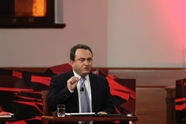 HASSAN MNEIMNEH
HASSAN MNEIMNEH
There's plenty of relevance in the Turkish experience, negative and positive, in the Arab context. But to distil that experience and to present it as a package deal as a model and then to feel good about it or not good about it, I think, is not appropriate. What is definitely the case in here is that the Arab world has to look carefully at what mistakes Turkey has made as well as what positive steps it has made. But, not unlike what was said: ultimately Turkey is trying to emulate or trying to abide by European standards - you know what, those European standards happen to be universal. Let us have an Egyptian attempt at abiding by universal standards too. Let us have a Tunisian one. Let there be a Tunisian model for Tunisia, an Egyptian model for Egypt, a Syrian model for Syria, and all can learn from each other. But this whole business of trying to package one model and present it as if it has some superior validity, I think that's where the problem is. [Audience applause]
TIM SEBASTIAN
Okay. Sinan Ülgen.
SINAN ÜLGEN
Just an anecdote to respond to this question. In Tahrir, when the protests were being organised, one of the key messages in social media was: `Keep your head up - you're an Egyptian.' When prime minister Erdoğan went to Egypt, one of the key messages in that same social media was: `Keep your head up - your grandfather was Turkish.'
TIM SEBASTIAN
Okay, on that note - I don't think anybody wants to follow up on that - a gentleman there.
AUDIENCE (M)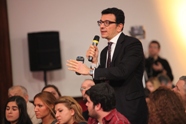 I'm an Iraqi and a Kurd. The Turkish model would be the last model that I would be implemented in Iraq. The arguments here have been about secularism and Islam, but still 20 percent of this population until recently could not even utter their names. So I don't want to waste the next eighty years in my country to reach where Turkey has reached today. The model that should be implemented in the Arab world should be much better than the Turkish model. Thank you. [Audience applause]
I'm an Iraqi and a Kurd. The Turkish model would be the last model that I would be implemented in Iraq. The arguments here have been about secularism and Islam, but still 20 percent of this population until recently could not even utter their names. So I don't want to waste the next eighty years in my country to reach where Turkey has reached today. The model that should be implemented in the Arab world should be much better than the Turkish model. Thank you. [Audience applause]
TIM SEBASTIAN
Aboubakr Jamaï.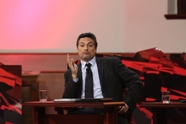 ABOUBAKR JAMAï
ABOUBAKR JAMAï
Again - I mean, I'm repeating the same thing over and over; the idea is not to repeat. Well, actually I agree with Hassan, what he said last. The idea is not to have - there is no such thing as a model for one nation state to the other. But when you are on our side of the fence and you look at the world and you look at the things that you identify with, the most workable model to reach some serious democratic setting is Turkey - not necessarily, certainly not as an endpoint to this journey, but certainly as a very good starting point.
ECE TEMELKURAN
Well, I had friends in Tahrir in Egypt, and they're quite progressed compared to Turkey. Like they can raise their voices, they can go on the street and want their rights. And Turkey cannot be a start-up even for like Morocco or for Egypt. Because recently one earthquake happened and the government provided people with nylon tents, and people died - froze to death, and babies froze to death. And our prime minister didn't want to see the numbers of those babies who froze to death. That's why we don't know the number of those babies who died. So this cannot be a starting point for any country on this earth, I think. [Audience applause]
TIM SEBASTIAN
Okay, gentleman in the second row and then I'll come to you.
AUDIENCE (M)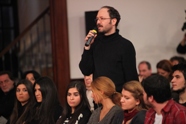 Hello. I am a member of the Lambda Istanbul Lesbian, Gay, Bisexual, Transgender Solidarity Association. And I would like to give a perspective from our community, because I think it's important.
Hello. I am a member of the Lambda Istanbul Lesbian, Gay, Bisexual, Transgender Solidarity Association. And I would like to give a perspective from our community, because I think it's important.
TIM SEBASTIAN
Briefly, please. And if you would come to a question, as well.
AUDIENCE (M)
Very briefly. Sure. Okay, I'd like to point out the authoritarian tendency in this country that has been ever-growing. And I think our case is a good example in this - and this is not about this government or that government, but I'm just not saying it's not going any better. The LGBT organisations are systematically being closed down. Trans people are being systematically murdered. And this is just a case out of the ordinary; these are not exceptions, just like the journalists' cases are not exceptions. And I think the way we're leading, where we're headed to, cannot be a model for the Arab world. Thank you.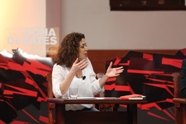 ECE TEMELKURAN
ECE TEMELKURAN
Very recently Gigek was on some TV channel talking about Turkish gays and how a gay parade happened very peacefully in Turkey, whereas the same day actually Kurdish demonstrators were - all of the TV ads - were all over Taksim, which happened just one hour before the gay parade. But CNN International and some other mainstream networks chose to show the gay parade - you know, `a Muslim country having a gay parade - hoo-hoo' kind of thing. 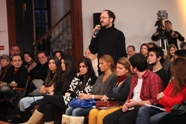 AUDIENCE (M)
AUDIENCE (M)
Sorry. And I'm sure he did not mention the systematic murders that's happening on a daily basis in this country. So that's very unfortunate.
ECE TEMELKURAN
Yes.
TIM SEBASTIAN
Sinan Ülgen, you would classify these things as shortcomings still? [Audience laughter]
ECE TEMELKURAN
Are you exhausted? [laughs]
SINAN ÜLGEN
I would certainly classify them as drawbacks, shortcomings. But to me these are very serious problems. I'm not going to challenge the veracity of those claims. But they do not take away from the value of the Turkish model. Because it is a matter - if you really want to talk practically, there is nothing out there. Yes, Ece, you gave the example of, you know, the tragedy of the earthquake and the Turkish state not being able to..
ECE TEMELKURAN
Those are not claims, by the way. They're not claims.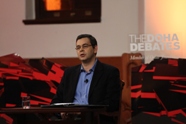 SINAN ÜLGEN
SINAN ÜLGEN
Yes, you can't start there. But sorry, you know, we live in a different world. That's where many of the country of the world...
ECE TEMELKURAN
Obviously we are. Obviously we live in a different world.
TIM SEBASTIAN
Please, if both people talk, nobody hears anything. Thank you.
SINAN ÜLGEN
Unfortunately that's where we're starting. And unfortunately that's where many of the countries in this region are starting from. So let's get practical about this. It's all nice to talk about, you know, having a very good democracy - who can argue against that? But at the end of the day what we've talked about here, all these shortcomings: they are very serious shortcomings, but I believe Turkey will overcome that. And it will overcome because it has created a model that, at the end of the day, works and delivers.
TIM SEBASTIAN
Ece Temelkuran.
ECE TEMELKURAN
At the moment I am based in Tunisia, and two days ago there was a demonstration in front of the government place. And I was so surprised because there was no teargas at all. So I think Tunisia might be a model for Turkey. [Audience applause]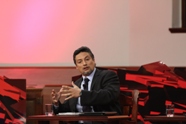 ABOUBAKR JAMAï
ABOUBAKR JAMAï
You see, this is the other problem with the whole framing, because there is no such thing as `the Arab world'. There are many countries with different histories, with different levels of development. [Audience applause] And I agree with you - when you talk about Tunisia, I agree with you. But there are other countries. We're talking about homosexuality: I'd love to see my...
ECE TEMELKURAN
No, no, no. Please...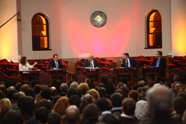 ABOUBAKR JAMAï
ABOUBAKR JAMAï
No, let me just finish that. There aren't laws on the books against homosexuality. Which is not the case here: you don't have laws. It's not illegal to be homosexual in this country. I know it's far from satisfactory. I completely sympathise with your situation. But... you are in a country with a so-called Islamist party governing this country. You don't have laws on the books against homosexuality. So...
ECE TEMELKURAN
Our prime minister doesn't like that term, by the way, `Islamist'. I was trying to say that from the very beginning - I mean, he doesn't like that. And he doesn't accept that, by the way. And coming to this `Arab world' thing, you know, there are various countries, of course. In Egypt - but authoritarian regimes are always alike. And I think the same teargas was used by SCAF in Tahrir, whereas Turkey use the same gas and toxin.
TIM SEBASTIAN
The Military Council.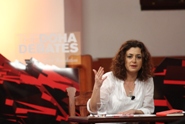 ECE TEMELKURAN
ECE TEMELKURAN
Because I know the smell. I smelled it all summer long, and I smelled the same gas in Tahrir.
TIM SEBASTIAN
Okay, I'm going to take a question from the gentleman in the second row.
AUDIENCE (M)
Okay. I'll call myself a world citizen - that's why I'm mentioning my citizenship. I'd like to thank the whole panel, both panels.
TIM SEBASTIAN
Where do you come from?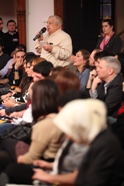 AUDIENCE (M)
AUDIENCE (M)
I was born here in Istanbul; I've lived in Saudi Arabia, in the United States and here. I'd like to thank the moderator especially, and I am going to ask whether we can actually vote for you rather than for either side. [Audience laughter] But basically the panellists..
TIM SEBASTIAN
Do you have a question? All right, thank you very much.
AUDIENCE (M)
Well, yes, I do have a question. The panellists have been excellent. I'd like to congratulate all of them, and for not using any strawman arguments or moverism or anything else. And I hope that the audience will vote on the basis of what they have heard rather than what their feelings are. Now, that was a statement. The question is: is there really such a thing as a Turkish model? Is it all a jigsaw 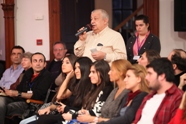 puzzle or a patchwork quilt which cannot be separated, the pieces cannot be separated from the whole with missing links, holes in it and missing pieces?
puzzle or a patchwork quilt which cannot be separated, the pieces cannot be separated from the whole with missing links, holes in it and missing pieces?
TIM SEBASTIAN
Okay. Hassan Mneimneh, would you like to...?
HASSAN MNEIMNEH
Yes. Actually there is a Turkish experience - I prefer not to think of it as a model. There's a Turkish experience that is of extreme relevance for the region, for the many reasons that were mentioned. 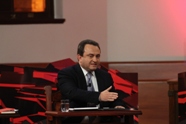 But there's also an Eastern and Central European experience that also has relevance because of fragmentation, because of dictatorship. There's a Latin American experience that has relevance because of development. The issue here is... I actually disagree about the notion that there's no Arab world - there is an Arab world. There's an affinity across these places. It started in Tunisia, it continues all over the place because of the linguistic and cultural affinity. But if we think of each country, each nation state, as its own domain, I think this is the better framework to work. I would like Egypt to benefit from the Turkish experience, from the Eastern and Central European experience, from the Latin American experience, from the Indonesian experience, without the illusion that we're importing a model. There's no such thing.
But there's also an Eastern and Central European experience that also has relevance because of fragmentation, because of dictatorship. There's a Latin American experience that has relevance because of development. The issue here is... I actually disagree about the notion that there's no Arab world - there is an Arab world. There's an affinity across these places. It started in Tunisia, it continues all over the place because of the linguistic and cultural affinity. But if we think of each country, each nation state, as its own domain, I think this is the better framework to work. I would like Egypt to benefit from the Turkish experience, from the Eastern and Central European experience, from the Latin American experience, from the Indonesian experience, without the illusion that we're importing a model. There's no such thing.
TIM SEBASTIAN
Okay. I want to..
AUDIENCE (M)
Excuse me. I was going to give my vote to you - until you talked now.
TIM SEBASTIAN
Okay. All right. I'm going to ask you to sit down. We haven't got much time, but I'd like to take a couple more comments, if we may. There's a gentleman there - you've had your hand up for a long time. Yes, you, sir. 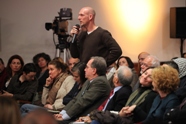 AUDIENCE (M)
AUDIENCE (M)
Hi. I'm an American. What seems to me the outstanding feature of the Turkish success has been the integration of an Islamic party into an existing secular structure and the ongoing democratic process. Yet, a free open and transparent debate being so fundamental to the functioning of a democracy, can we really regard this as a success when the first thing we point to - being the integration of an Islamic party - has set about immediately gnawing at the roots of a democracy?
TIM SEBASTIAN (to questioner)
What about the shortcomings?
AUDIENCE (M)
Of what?
TIM SEBASTIAN
In the Turkish model, that Sinan Ülgen has characterised as shortcomings. The problems that people have raised. The human rights issues. The free speech.
AUDIENCE (M)
My question relates to the fact that we seem to hold up as one of the successes of the Turkish state the fact that they have now integrated an Islamic party. Yet that party has set about disassembling one of the things that's most fundamental to a democratically functioning state. So doesn't that invalidate the premise that they've successfully integrated an Islamic party?
TIM SEBASTIAN
Okay. I'm going to take another comment. Lady in the front row.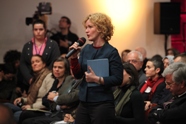 AUDIENCE (F)
AUDIENCE (F)
I think one of the panellists have nailed what I'm going to ask on the head, which is: is there one Arab world? And is there one example that we can hold up as the Turkish example, as Turkey has been transiting from one point to the other - and we don't know where right now. And my question is to all of the panellists: what part of the Arab world might take Turkey as an example, if any?
TIM SEBASTIAN
Hassan Mneimneh, what's your...?
HASSAN MNEIMNEH
Well, again, here there is an Arab world but it overlaps with many other worlds. There is a Kurdish world that extends from Lebanon all the way to the Caucasus. There is a Christian world.
TIM SEBASTIAN
Okay, but which part would take Turkey as the model?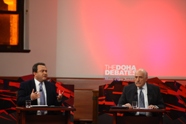 HASSAN MNEIMNEH
HASSAN MNEIMNEH
No, actually I think the question assumes that Turkey can present itself as a package deal, and my argument is that Turkey can present its exteriors and many facets of it that are of various relevance. Definitely the Egyptian body politic has to learn from the Turkish way of disassociating the military from the civilian. But you know what, they do not have to learn from the exclusion of the minorities or of ultimately what is a negation of the existence of those minorities.
TIM SEBASTIAN
Okay. Sinan Ülgen, you want to comment?
SINAN ÜLGEN
I'm sorry, but the experience did not create the model. The model created the experience. So we cannot talk about Turkish experience as if there was no Turkish model.
TIM SEBASTIAN
Okay. I have a gentleman there who would like a quick - yes, you, yes.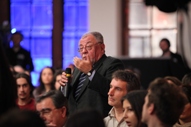 AUDIENCE (M)
AUDIENCE (M)
Thanks very much. I am a social scientist, so when I hear about these generalisations about Arabs and the public opinion and all, I'm a bit disturbed. Number one, when you talk about Arabs there are not only nations but there are Christian Arabs, there are secular Arabs. But when you talk about the Arabs you are somehow implying only the Islamists, I felt, but you forget the others. And when my friends talk about Turkey, there is not only new Turkey but there is the Turkey of the secular participation of women in politics, the beginnings of parliament and all that, which was also a model, had been a model earlier, and the Arab countries want secularisation.
TIM SEBASTIAN
Do you have a question, please?
AUDIENCE (M)
Yes, I am coming to that. Very brief. And when I come to Sinan and Mustafa, my dear friend, they talk about AKP. And my question to them: whether they mean AKP with Erdoğan's single-handed rule or AKP that had some promise of democratisation? So they should differentiate. Question: why come to Turkey, which has so many pitfalls? And why would my Arab colleagues have a compromise? Why don't you go to Britain? Why don't you go to the heart of democracy and the origins of it and come to Turkey, where we have not been very successful at all recently? There are different parts of our experience. Secularism and all that is a very nice thing, very good to feel affinity with. But if you're talking about a political model, we have not been very successful lately. So don't take these pitfalls. My question: why come here? Go to Britain. And it fits.
TIM SEBASTIAN
Aboubakr Jamaï. Okay.
AUDIENCE (M)
And in fact it fits. With regard to the social structure it suits our Arab countries and it is more suitable to them than the Turkish experience.
TIM SEBASTIAN
Aboubakr Jamaï.
ABOUBAKR JAMAï
Because I don't have a magic wand that I will use with my people and ask them to go to Britain. They think that culturally and for many reasons Turkey is more relevant to them. And my view as a democrat is how to begin with this Turkish model, which I still find valid for this starting point, and go towards something that might look like Britain.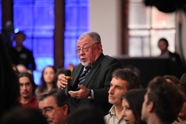 AUDIENCE (M)
AUDIENCE (M)
Very brief response: do you want a Turkish model with Erdoğan or without Erdoğan? Question.
ABOUBAKR JAMAï
No, I said, I think this is a serious flaw, actually.
AUDIENCE (M)
You want it with Erdoğan or without Erdoğan? You know, with social...?
ABOUBAKR JAMAï
No, I want to do it...
AUDIENCE (M)
..... or, you know, with...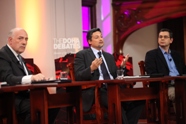 ABOUBAKR JAMAï
ABOUBAKR JAMAï
No, I don't - I don't know Erdoğan. I'm not going to make that judgement. What I can tell you is I don't want a system that will lend to the existence of an over-powerful party for a very long time. That's what I don't want.
TIM SEBASTIAN
Sinan Ülgen, do you want to answer that direct question: with or without Erdoğan?
SINAN ÜLGEN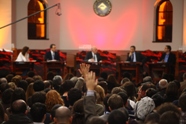 That's irrelevant.
That's irrelevant.
TIM SEBASTIAN
Why? He asked it.
SINAN ÜLGEN
That's totally irrelevant. Because the Turkish model...
TIM SEBASTIAN
He asked the question.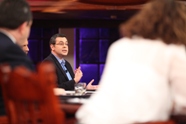 SINAN ÜLGEN
SINAN ÜLGEN
Yes, but the Turkish model is not about Erdoğan. It's not about Deniz Baykal; it's not about Kilicdaroglu. It's about the institutions, how we have created these institutions since 1923. How we have managed the rise of political Islam. How we have created a vibrant democracy. It's all about institutions; it's not about people.
AUDIENCE (M)
Sinan, I hate to tell you that you are irrelevant - it won't sound polite. But your response was irrelevant. Thank you very much.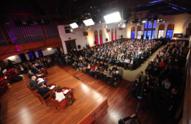 TIM SEBASTIAN
TIM SEBASTIAN
All right, thank you. Ladies, and gentlemen, we've come to the point we are going to vote in a moment on the motion, but first I'm going to ask each of the panellists to crystallise their ideas in one sentence before we go to that vote, starting with Ece and moving round to Sinan. Ece Temelkuran, one sentence, please.
ECE TEMELKURAN
Arabs should talk to Arabs about which model would be best for them. They should hear their own voices. Turkey cannot be a model, as I said in the beginning, because Arabs have already enough problems.
TIM SEBASTIAN
Okay. Hassan Mneimneh, one sentence, please.
HASSAN MNEIMNEH
Everyone has a lot to learn from everyone, but beware of the use of the Turkish model as a cover for the insertion of Islamism into positions of power where they would be really entrenched in the Arab world.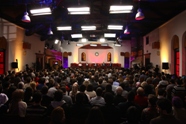 TIM SEBASTIAN
TIM SEBASTIAN
Okay. Aboubakr Jamaï.
ABOUBAKR JAMAï
Well, this is a workable model for us because I don't believe that Islamism is inherently bad; that it can evolve. And I hope that it will evolve in our countries, because our population relates to this model.
TIM SEBASTIAN
Okay. Sinan Ülgen, please. One sentence.
SINAN ÜLGEN
The reason why we're here today talking about Turkey as a model is because the Arab world is talking about Turkey as a model. [Audience applause]
Vote result
TIM SEBASTIAN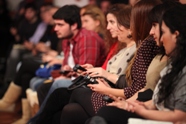 Okay, we are at the point, ladies and gentlemen, we're going to vote on the motion that ‘This House believes that Turkey is a bad model for the new Arab states'. Let me just explain about the voting machines, if you'd take them. If you want to vote for the motion - that is the side represented by those on my right - you will in a moment press Button 1. If you want to vote against the motion - the side represented by those on my left - it's Button 2. Whichever button you want to press, would you please do it now. You only have to press once. Your vote will go straight to our computers, and we'll have the results for you in about twenty seconds.
Okay, we are at the point, ladies and gentlemen, we're going to vote on the motion that ‘This House believes that Turkey is a bad model for the new Arab states'. Let me just explain about the voting machines, if you'd take them. If you want to vote for the motion - that is the side represented by those on my right - you will in a moment press Button 1. If you want to vote against the motion - the side represented by those on my left - it's Button 2. Whichever button you want to press, would you please do it now. You only have to press once. Your vote will go straight to our computers, and we'll have the results for you in about twenty seconds.
Right, there is the vote coming up: 59 percent for the motion, 41 percent against. The motion has been resoundingly carried. [Audience applause] All that remains for me to do is to thank our distinguished panellists. Thank you very much for coming here tonight. Thank you to you, the audience, for your questions. The Doha Debates will be back again in a month's time, though sadly not from Istanbul. Till then, from all of us on the team, have a safe journey home. Good night. Thanks for coming. Good night. [Audience applause]
Watch online

